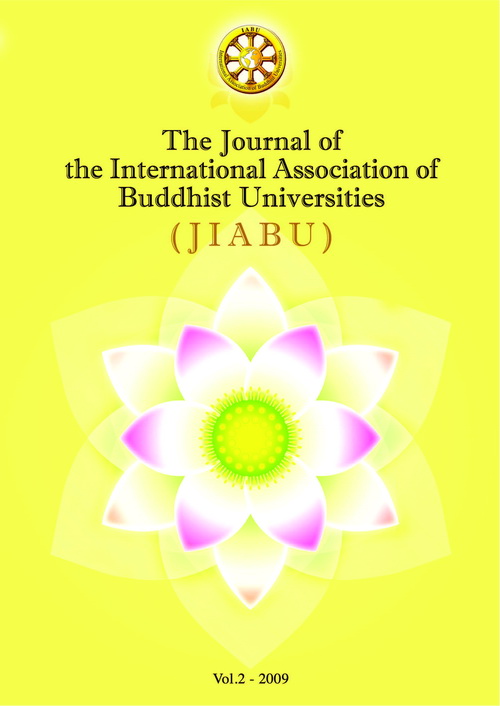Emerging New Trends in Buddhism and Their Doctrinal and Organizational Implications
Main Article Content
Abstract
That all constructed phenomena are subject to change is one of the fundamental insights of the teaching of the Buddha. Usually, this concept is understood in the context of meditation, as characterizing the phenomenal existence. It is, however, interesting to see how change takes place within the Buddhist tradition itself.
Article Details
How to Cite
Tilakaratne, A. (2009). Emerging New Trends in Buddhism and Their Doctrinal and Organizational Implications. The Journal of International Association of Buddhist Universities (JIABU), 2(1), 96–120. retrieved from https://so06.tci-thaijo.org/index.php/Jiabu/article/view/204985
Issue
Section
Article
Views and opinions expressed in the articles published by The Journal of the International Association of Buddhist Universities (JIABU), are of responsibility by such authors but not the editors and do not necessarily reflect those of the editors.
References
Badiner, Allan Hunt, 1990, Dharma Gaia: A harvest of Essays in
Buddhism and Ecology California, Berkeley: Parallax Press.
Batchlor, Martine and Brown, Kerry (ed.), 1992 Buddhism and
Ecology, London: Cassells.
Deegalle, Mahinda (ed.), 2008, Dharma to the UK: A Centennial
Celebration of Buddhist Legacy, London: World Buddhist
Foundation.
Eppsteiner, Fred (ed.), 1988, The Path of Compassion: Writings on
Socially Engaged Buddhism, Berkeley, California: Parallax
Press.
Finley, Ellison Banks (ed.), 2000, Women’s Buddhism and
Buddhism’s Women: Tradition, Revision, Renewal, Boston:
Wisdom Publications.
Harris, Elizabeth J., 2006, Theravada Buddhism and the Buddhist
Encounter, London and New York: Routledge.
Jones, Ken, 1993, Beyond Optimism: A Buddhist Political Ecology,
Oxford.
Peiris, Aloysius S.J., Dialogue (New Series), Colombo: Centre for
Study and Dialogue.
Queen, Christopher S, 1996, “Engaged Buddhism: Buddhist
Liberation Movements in Asia, (ed) Christopher S. Queen
and Sallie B. King, New York: SUNY Press.
Queen, Christopher S., and King, Sallie B.(ed.), 1996, Engaged
Buddhism: Buddhist Liberation Movements in Asia, New
York: SUNY Press.
Seneviratne, H.L., 1999, Work of Kings: The New Buddhism in
Sri Lanka, Chicago: The University of Chicago Press.
Seth, Noel S.J., 1988, “Buddhism and Communalism”, Religion
and Society, (Vol. XXXV, No/4, December.)
Buddhism and Ecology California, Berkeley: Parallax Press.
Batchlor, Martine and Brown, Kerry (ed.), 1992 Buddhism and
Ecology, London: Cassells.
Deegalle, Mahinda (ed.), 2008, Dharma to the UK: A Centennial
Celebration of Buddhist Legacy, London: World Buddhist
Foundation.
Eppsteiner, Fred (ed.), 1988, The Path of Compassion: Writings on
Socially Engaged Buddhism, Berkeley, California: Parallax
Press.
Finley, Ellison Banks (ed.), 2000, Women’s Buddhism and
Buddhism’s Women: Tradition, Revision, Renewal, Boston:
Wisdom Publications.
Harris, Elizabeth J., 2006, Theravada Buddhism and the Buddhist
Encounter, London and New York: Routledge.
Jones, Ken, 1993, Beyond Optimism: A Buddhist Political Ecology,
Oxford.
Peiris, Aloysius S.J., Dialogue (New Series), Colombo: Centre for
Study and Dialogue.
Queen, Christopher S, 1996, “Engaged Buddhism: Buddhist
Liberation Movements in Asia, (ed) Christopher S. Queen
and Sallie B. King, New York: SUNY Press.
Queen, Christopher S., and King, Sallie B.(ed.), 1996, Engaged
Buddhism: Buddhist Liberation Movements in Asia, New
York: SUNY Press.
Seneviratne, H.L., 1999, Work of Kings: The New Buddhism in
Sri Lanka, Chicago: The University of Chicago Press.
Seth, Noel S.J., 1988, “Buddhism and Communalism”, Religion
and Society, (Vol. XXXV, No/4, December.)


